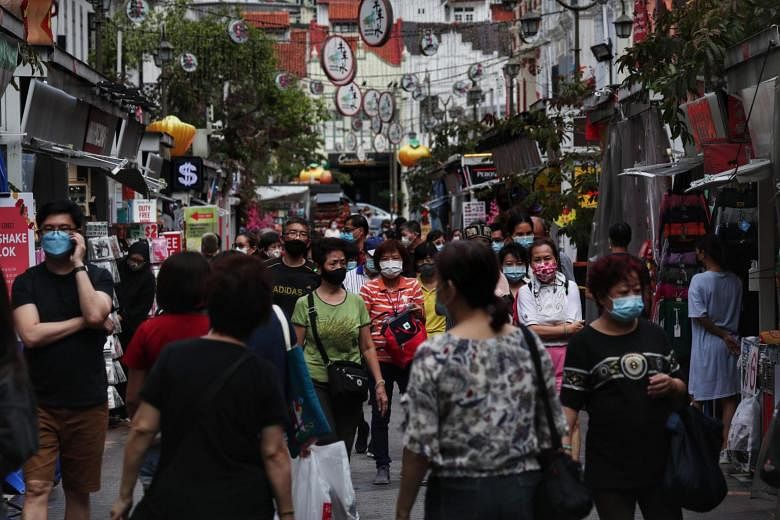SINGAPORE - Over the past year, Singapore residents have better learnt to cope with the Covid-19 pandemic on various fronts even as many remain cautious over their livelihoods, the Institute of Policy Studies (IPS) found in a new paper.
And societal trust - the "social glue" that builds strong communal bonds and improves psychological well-being - has played a key role in helping the country adapt to the new normal, researchers said.
As a general rule, people's attitudes on issues such as job prospects and overall well-being took a hit last year when the pandemic began, but had recovered by the time the study ended in March.
"What we see, one year into the crisis, is that our society is clearly vulnerable to crisis but Singaporeans are clearly adaptable," said IPS principal research fellow Mathew Mathews, who also heads the institute's Social Lab for social indicator research.
One reason society has been able to adapt to the challenges of living in a pandemic has been the raft of government policies that have helped reduce people's concerns and fears, he added.
The study carried out online polls with groups of 500 Singapore residents at regular intervals between last April and March this year.
It asked for their thoughts on topics such as stress levels and finances, as well as attitudes towards Singapore's safe management measures and ongoing vaccination drive.
Researchers also asked about respondents' work arrangements, perceptions of the job market, and their satisfaction with how the Government has handled the pandemic.
Those who had less trust in Singapore and Singaporeans - measured by their responses to questions such as whether the country would remain united and emerge stronger - tended to feel more threatened by the pandemic, and therefore had worse overall well-being.
In contrast, the well-being of people with high levels of trust was less affected by perceived threats posed by Covid-19.
These results show that trust can serve as a form of social capital in the crisis, "protecting people against the harmful and threatening effects of the pandemic", researchers said.
"Enablers of societal trust - such as effective information management, enforcement of desirable social norms, and fair and equitable treatment for all - must therefore continue to be a priority for governments."
One significant difference over the course of the year was Singaporeans' sentiments on the job market.
In late May, eight in 10 respondents said they felt the job market in the next six months would be bad. This number had gone down to four in 10 by March, with the proportion of people believing that the job market would be better going up from 13 per cent to 31 per cent in the same period of time.
When asked about securing a job with similar benefits and pay within six months, should they be retrenched, around 58 per cent of people polled in June said they were not confident in doing so. This had gone down to about 45 per cent by March this year.
Respondents' overall confidence that they would still have a job within the next six months also stayed at around 53 per cent throughout the study, although age, income and education level had an impact on individual results.
The higher levels of concern seen last year were likely because many people were worried about job losses, Dr Mathews said. Later on, government schemes to help companies keep workers employed allayed some of these fears.
"The reality is that more people are in the job market, they've not been retrenched and there have been all kinds of training opportunities... that's allowed confidence to hold," he added.
Sentiments about working from home also improved. In September last year, around 60 per cent of respondents who mostly worked from home said they enjoyed working from home and were productive doing so. By the time the study ended, 80 per cent said they enjoyed working from home, with 73 per cent believing they were productive.
On vaccinations, people surveyed in March were more likely to want to get vaccinated, compared with those surveyed a month before. Concerns over issues such as vaccine safety also declined but remained significant, with around half the respondents in March saying they were worried that the safety and side effects were not fully known.
The study also threw up several trends unique to younger participants.
Younger people were more likely to be worried about vaccine safety, as well as to be psychologically impacted by the pandemic.
For instance, three in 10 Singaporeans aged between 21 and 29 - the youngest age group surveyed - were at least somewhat worried about losing their purpose for living, compared with only a tenth of those aged 60 and above.
Just under three in 10 in this youngest group also said they experienced trouble sleeping or staying awake in recent months, as compared with a tenth of those in the oldest cohort.
In contrast, younger participants tended to be more sanguine about their prospects in the job market.
When asked if they were confident that they would have a job in the next six months, 60.9 per cent of the youngest participants said they were at least somewhat confident. This figure went up to 64.6 per cent for those aged 30 to 39.
In comparison, around 50 per cent of those aged 50 and above shared that view.



